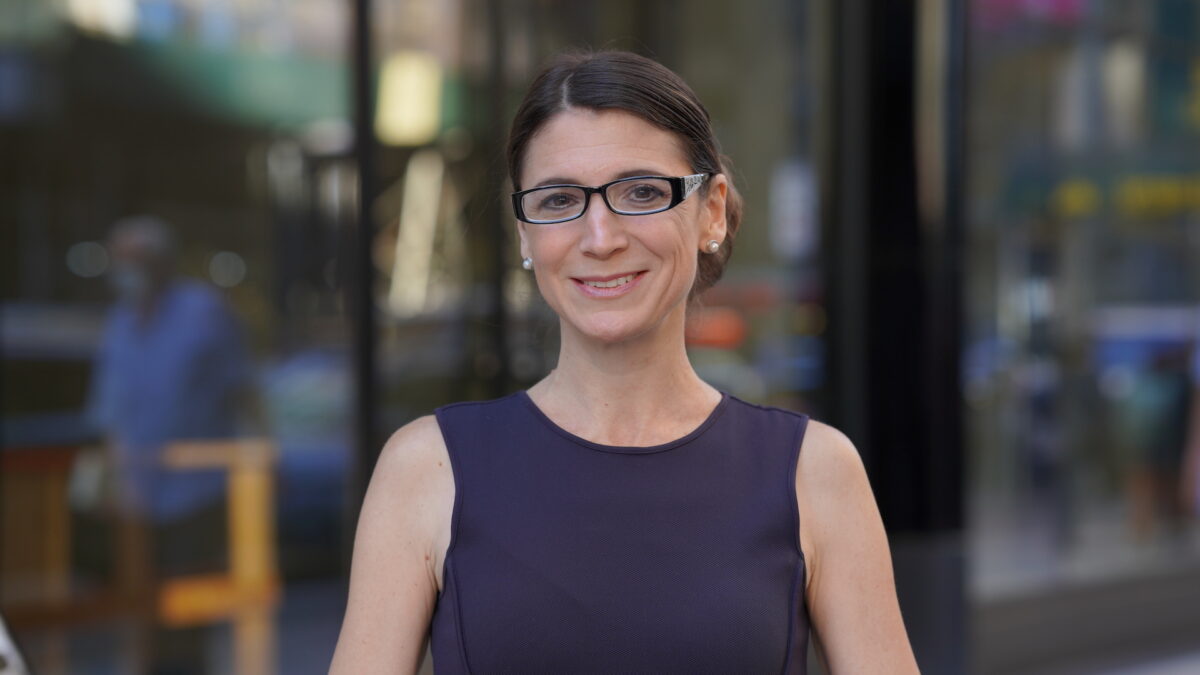By Jan Jekielek and Masooma Haq
In what she has called a David versus Goliath battle, New York real estate lawyer Bobbie Anne Cox sued Governor Kathleen Hochul for issuing directives mandating quarantine for people exposed to or infected with highly contagious diseases such as COVID-19. The directives, dubbed “quarantine camp regulations,” have been compared to laws that relocated Japanese during World War II without due process. Cox won the lawsuit on the grounds that Hochul’s regulation was unconstitutional.
In a recent interview on Epoch TV’s American Thought Leaders, Cox told host Jan Jekielek that it’s crucial Americans learn about the U.S. Constitution so that they can prevent similar acts by state and federal governments.
“The constitution is not perfect, but it’s brilliant,” Cox said. Schools should require learning about the U.S. Constitution, “from the little kids all the way up through high school, into college. The constitution was written to keep the government in check. The constitution wasn’t written to keep the people in check.”
Our founding fathers came to this continent fleeing tyranny, Cox said. “They wrote the constitution in such a manner that if it’s followed, there wouldn’t be tyranny on these shores, ever. Yet, here we are, 250 years later, and we’re fighting tyranny.”
It is tyrannical for a government to take power to which it is not entitled, Cox explained. During the pandemic, state and federal governments gave themselves powers the constitution did not give them.
State governors are part of the executive branch of government. As such, she said, “they’re supposed to enforce laws, and their agencies beneath them are supposed to help them enforce laws. They’re not supposed to make laws.”
When a governor such as Hochul takes on powers that properly belong to the legislature, “that’s tyranny,” Cox reiterated.
“The attitude is kind of like, ‘Well, we know we can’t do this, but we’re going to do it anyway.’ And then the theory is, ‘Catch me if you can.’”

Understanding Our Rights
Unconstitutional mandates and regulations have been thrust upon the public, Cox said, because American citizens don’t know their rights. “I think if people understood what their rights are, they would say, ‘Hold on a second, you can’t do that.”
“In the history of mankind, no government has ever taken power from the people, and then just voluntarily given it back.”
Nonetheless, “the people have to demand it back,” Cox said. “The people won’t demand it back unless they know that they have the right to that power. So I think there needs to be an education process in the United States so that people understand, ‘Oh, these are my rights.’”
The Executive Branch Cannot Legislate
At the beginning of the pandemic lockdowns, former Governor Andrew Cuomo was given emergency powers by the New York legislature to implement “directives.” Those emergency powers, according to Cox, essentially gave him legislative powers.
“The legislative branch can’t delegate their lawmaking power to another branch of government, but they did, and for a whole year, Cuomo had this power … He then passed it on to his commissioner of health,” said Cox.
After Cuomo stepped down in August 2021 and Hochul became interim governor, she continued the regulations despite criticism that she was sidestepping the legislature. When Cox learned about this, she was impelled to sue in order to stop the government overreach.
Quarantine Regulation Based on Rejected Bill
Cox sees this type of control by the governor as tyrannical and “wholly unconstitutional” for many reasons, including the fact that the New York legislature rejected the quarantine rule in a bill years before.
“It’s the story of a tyrannical governor and her department of health, doing something that they want to do, but the people don’t want them to do it. And the people’s representatives in the New York state senate and the assembly don’t want them to do it.”
The quarantine camp regulation was based on a bill that was proposed in 2015 by New York state assemblyman Nick Perry (D-Brooklyn) during the Ebola outbreak. The regulation was rejected by the state legislature and withdrawn from consideration, said Cox.
After Cuomo resigned, through a simple vote, Hochul and her advisors issued the directive that ultimately gave the governor and the New York Department of Health the power to lock up anyone they deemed contagious.
“They could have locked you up in your home, or they could have removed you from your home and locked you into a facility of their choosing,” said Cox. There was no restriction on age, proof of sickness or exposure, or time limit to the quarantine.
“There was nothing in the regulation that would allow you to try to negotiate your way out of this,” added Cox, and the regulation does not follow either state or U.S. constitutions because it does not lay out the rights of the person forced into quarantine.
“In the judge’s decision, he actually said [that] this regulation gives lip service to due process,” said Cox. “‘You mention it, but you don’t actually have any due process built in there.’”
“Involuntary detention is a severe deprivation of individual liberty, far more egregious than other health safety measures, such as requiring mask wearing at certain venues,” the court’s opinion read. “Involuntary quarantine may have far-reaching consequences such as loss of income or employment and isolation from family.”
The governor’s regulation also conflicted with section 2120 of New York’s public health law, a longstanding regulation. “That tells you how you quarantine somebody if they’re a public health threat,” Cox said. However, the existing law contains multiple due process protections, beginning with a requirement to prove that the individual in question has the disease.
From Real Estate to Constitutional Law
Having worked with clients in property cases against local and state governments, Cox recognized that the government’s mandates were illegal. She said she knew that two weeks of lockdown would not end there.
“I also said to myself, this is completely unconstitutional. He can’t do this. He can’t force people to shut their businesses and stay home,” Cox said.
She immediately started speaking out about the illegitimacy of the lockdowns. She was bombarded by business owners and landlords asking her if the forced closures and rent moratorium were legal, and what they could do to fight back.
“We were seeing small businesses, landlords, people who were just getting decimated by the government.”
Cox started a YouTube channel explaining the rights that the Constitution ensures, but the platform removed her videos. She then moved the channel to Rumble.
Before moving forward with her lawsuit against Hochul, Cox wrestled with the decision to put her business and livelihood on hold. She took the case, convinced that the type of governmental overreach it hoped to stop would spread like “cancer” if not checked.
Getting Ahead of Hochul’s Regulation
Cox did not want to wait until the regulation went into effect and the public was injured by it, so she thought creatively about how to sue and prove the regulation was unconstitutional, she said.
Cox considers herself a Democrat but worked with Republican lawmakers because she believes government overreach is not a partisan issue.
“I’m actually a Democrat … In my mind, this is not a political thing. This is a human rights issue. This is a constitutional issue … This is about being an American, and something people have really forgotten. It’s not people’s fault. I think it’s because we just really don’t teach this in school anymore.”
She asked Senator George Borrello, Assemblyman Chris Tague, and Assemblyman Mike Lawler to join the suit. “They said, ‘Absolutely. We believe in this; we’re going to do it.’”
Ultimately, Cox proved the unconstitutionality of the quarantine camp regulation, but there were many challenges along the way.
Cox said New York attorney general Letitia James stalled the case by admitting it to a district where Cox was not admitted, and later opposed the amicus brief filed in the case. That caused more time and financial loss for Cox but ultimately gained more support for her efforts.
If the judge had ruled against Cox’s case, the message would have been clear. “The legislature doesn’t matter … they can make any laws they want, but that’s okay, because the executive branch is just going to overrule them with its regulations.”
James appealed the state Supreme Court ruling in July, but the appeal has not been pursued, said Cox. Lawyers in other regions and countries have reached out to Cox for advice on how to defeat similar regulations in their jurisdictions.
The Epoch Times reached out to the New York attorney general’s office and Hochul’s office for comment.
Stopping a Different Sort of Contagion
Many fellow Democrats have told Cox that the party has changed, she said, and millions of New Yorkers have fled to other states to live in a less restrictive environment.
“Some of us have to stay and fight. We can’t all flee. Because if they win in New York, it’s going to spread like a cancer across the country, and then there’s no place left to hide.”
She has been encouraged by the victory, and will continue to work in the area of constitutional law, she said.
“I think that the constitution must be upheld or we’re going to lose our republic. It will cease to exist as we know it.”





